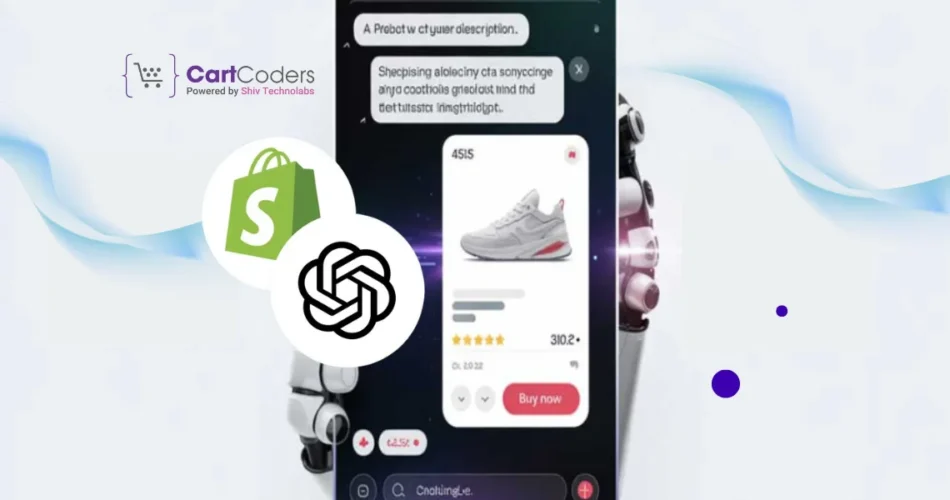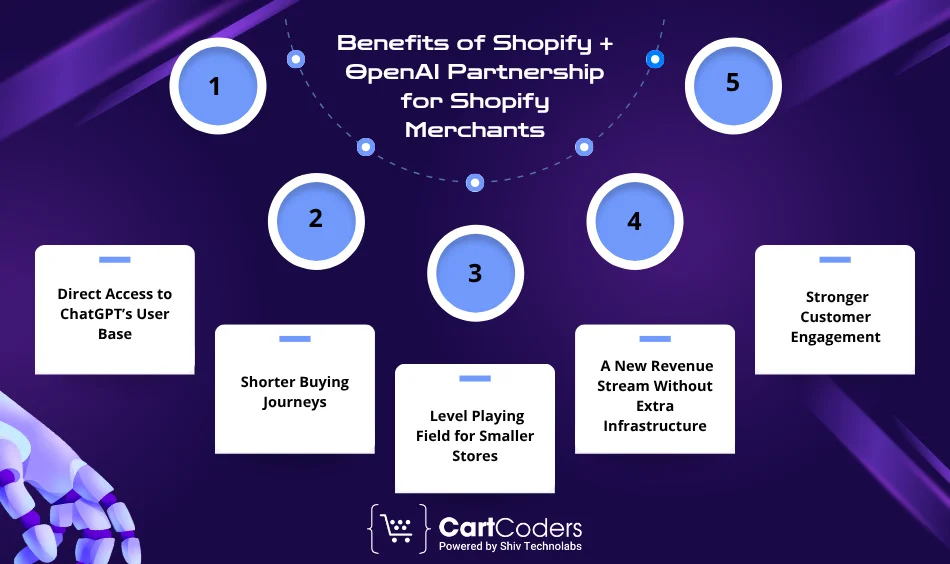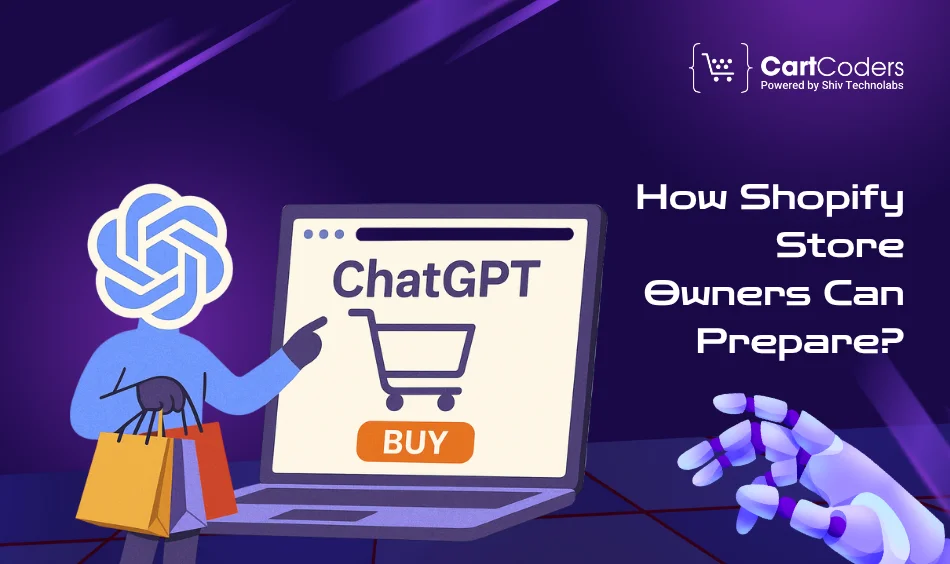Custom Engagement Solutions
Unlock tailored solutions with a free, no-obligation strategy session.
Expert Developers & Engineers on Demand
Scale Your Team with Skilled IT Professionals
Expert Guidance for Digital Transformation

Shopify has officially teamed up with OpenAI — and this isn’t just another integration update. It marks the start of a new era where products can be discovered and purchased directly inside ChatGPT.
For merchants, this move opens the door to a sales channel that didn’t exist until now. Imagine a shopper asking ChatGPT for “the best running shoes under $100” — and your Shopify store showing up as a direct buying option.
This shift means two things: more opportunity to reach buyers where they already are, and more responsibility to prepare your store for AI-driven commerce.
In this article, we’ll break down:
Shopify’s partnership with OpenAI is designed to bring shopping closer to conversations. Instead of switching between apps or sites, buyers can discover products and complete purchases without leaving ChatGPT.
Here’s what the announcement covers:
For merchants, this isn’t just about visibility — it’s about being part of a system where AI becomes the shopping assistant and the cashier at once.
[Data Source: Shopify]
The Shopify + OpenAI partnership isn’t just a headline — it’s a real chance for merchants to rethink how they reach and convert buyers. Here’s a closer look at the benefits:
ChatGPT has millions of engaged users worldwide who rely on it for daily tasks, recommendations, and decisions. For Shopify merchants, this means direct entry into a high-intent audience. Instead of fighting for clicks through ads or SEO, your products could appear naturally within conversations.
Traditional online shopping often involves multiple steps: search → browse → add to cart → checkout. With OpenAI’s integration, this funnel collapses into a single flow. Shoppers can ask, discover, and purchase in one place. Fewer steps mean fewer chances for abandoned carts and more completed sales.
AI-powered recommendations don’t automatically favor giant retailers. Well-prepared product feeds and structured data can give smaller stores visibility alongside bigger brands. For independent merchants, this is a rare chance to compete on equal ground without massive marketing budgets.
Merchants don’t need to build a new website or app. By applying to be part of Shopify’s OpenAI integration, existing stores gain a brand-new sales channel. It’s an additional revenue stream that works in parallel with your store, social channels, and marketplaces.
Because recommendations in ChatGPT are conversational, they feel more personal and relevant. When customers discover your products in a natural chat, it can strengthen trust and improve loyalty.
The Shopify + OpenAI partnership offers a huge opportunity, but merchants need to prepare carefully. Here are the key things to consider before applying:
AI relies on clean and updated information. If your pricing, stock, or product attributes don’t match, you risk losing credibility.
To be surfaced in ChatGPT, your product content must be structured and descriptive. Generic listings won’t perform well in conversational searches.
Shoppers expect a smooth post-purchase experience once they buy directly in ChatGPT. Poor service could damage both reputation and AI ranking.
The new channel will attract both small and large merchants. While big brands may dominate, niche sellers can still shine.
Selling through AI requires backend efficiency. A broken link in checkout or shipping could hurt your adoption.
As Shopify and OpenAI refine rules, compliance will become important. Being transparent from day one can prevent issues later.

Getting ready for Shopify’s OpenAI integration isn’t just about applying — it’s about making sure your store is AI-ready. Merchants who prepare early will have a better chance of standing out.
Start by reviewing all product information in your Shopify store. Inaccuracies or incomplete fields can reduce visibility inside ChatGPT.
AI agents surface products based on relevance, not just brand name. Position your store to match natural language queries.
Smooth post-purchase flow will be critical when sales come directly from ChatGPT.
Customer questions inside ChatGPT will reveal trends. Merchants can use this data to refine listings and anticipate demand.
Preparing for AI commerce requires both technical and strategic alignment. Partnering with Shopify experts can accelerate readiness.
Both Shopify and Google are betting on AI-driven shopping, but their approaches differ in important ways. For merchants, understanding this distinction helps set realistic expectations.
Why Shopify’s Move Matters More for Merchants:
This means Shopify merchants get a faster path to conversions, while Google remains a discovery-focused tool.
The partnership between Shopify and OpenAI is more than a one-time announcement — it’s a glimpse into the future of how commerce will work. Buying decisions are moving away from traditional websites and toward AI-driven interactions.
AI assistants are evolving from recommendation engines into transactional agents. Soon, shoppers may rely on them not just to find products, but to manage reorders, compare warranties, and suggest alternatives.
The classic path of discovery → browsing → cart → checkout is shrinking. In its place, merchants will see intent-driven sales where the entire journey is compressed into a single interaction. This will raise conversion rates but also increase the pressure on merchants to keep product data flawless.
Just as early adopters of eCommerce, social selling, and mobile apps gained an advantage, merchants who prepare for AI commerce early will lead in visibility. Smaller stores, especially niche ones, can carve out space before the field gets crowded.
AI won’t just sit inside ChatGPT. Expect commerce agents to appear in smart speakers, wearables, and even in-car systems. A shopper could simply say, “Order my favorite coffee pods,” and Shopify + AI will handle the rest.
The takeaway: AI-driven commerce is shifting shopping from a search-based habit to a conversation-based behavior. Merchants that understand and prepare for this transition will secure long-term growth.
The Shopify + OpenAI partnership is more than just a feature rollout — it signals a shift in how buying will happen in the near future. For merchants, this is both an opportunity and a challenge. Opportunity because millions of ChatGPT users could become direct customers. Challenge because product data, content quality, and customer experience must all be sharpened to fit this new buying channel.
The winners will be the merchants who act early, prepare their stores for AI-driven discovery, and treat this channel with the same seriousness as their website or social platforms.
At CartCoders, we help Shopify merchants stay ahead of these shifts — from preparing AI-ready product feeds to building stores that are future-proof for emerging sales channels like ChatGPT. Whether you’re a growing brand or an established retailer, our team can guide you in making your Shopify store ready for this new phase of commerce.
Are you ready for your Shopify store to sell directly inside ChatGPT? Contact CartCoders now!
Projects delivered in 15+ industries.
95% retention rate, building lasting partnerships.
Serving clients across 25+ countries.
60+ pros | 10+ years of experience.